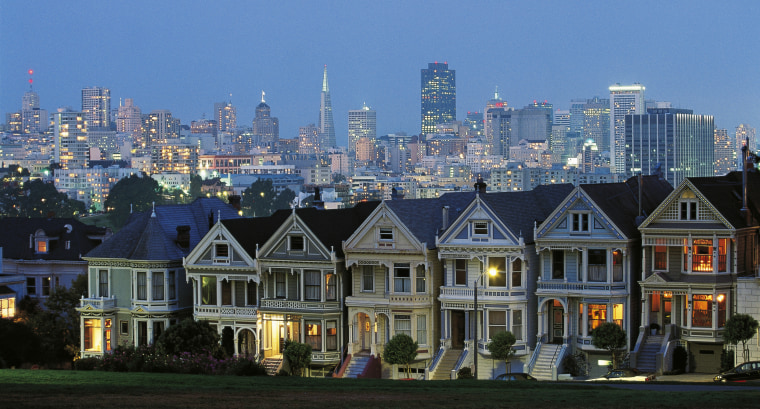SAN FRANCISCO — Several years ago, Annie Tsai and her husband looked at two things — a calendar and a map — and decided to speed up their plans to buy a house.
They had to hurry, because they were afraid Facebook employees would beat them to a good house.
The calendar in early 2012 showed that Facebook would be making an initial public offering of stock in mere months, and the map showed Facebook’s headquarters in the heart of Silicon Valley, the same area they wanted to buy in. With dread, they imagined Facebook employees showing up at open houses with windfalls of cash from their newly public stock.
“If you just drew a 45-minute commuting radius around that, it was likely it would impact the property-buying market,” Tsai, who has worked at a several tech companies but not Facebook, said recently.
Acting quickly, the couple lowered their sights a little and made an offer on a house that needed remodeling. They closed weeks ahead of Facebook’s May 2012 IPO. It was just in time; home prices in the Bay Area began soaring around the same time, and some properties began getting dozens of offers.
Big tech companies including Facebook have contributed mightily to San Francisco’s housing crunch, and their ranks look poised to grow. The Bay Area is staring at a possible flood of stock listings in 2019 from tech startup “unicorns” including Uber, Lyft and Slack.
And if past patterns hold, the country’s most expensive housing market may suddenly become even more exclusive.
The median home value in the city of San Francisco is about $1.4 million, according to real estate website Zillow, and it’s not much lower in surrounding cities. That compares with $1.3 million in Manhattan, $682,600 in Los Angeles and $181,800 in Houston, Zillow says.
Like other highly anticipated tech IPOs, the possible debuts of Uber and others would be a chance for early employees to cash out of stock options they’ve been holding for years and to spend the proceeds, possibly on homes.
“The piggy bank gets broken open, so to speak,” said Igor Popov, chief economist at online rental company Apartment List.
The Bay Area already has the highest housing prices in the nation, both for renters and potential homebuyers, as construction hasn’t kept pace with an influx of newcomers and the tech wealth that has come with them. The resulting housing crisis has been blamed for a cascade of related problems such as worsening homelessness, 90-minute “super commutes” and rising inequality.
Economists and real estate agents said they expect the next wave of tech IPOs, if it goes as investors hope, to make the housing shortage worse.
Tech employees often receive shares in their company, known as restricted stock units, as part of their compensation. Workers typically need to hold the stock for as long as four years to receive the full benefit, and they have limited opportunities to sell shares before an IPO. Even then, they might need to wait for the expiration of a “lockup period,” which often is 180 days.
Once they’re free to sell, there could be hundreds of people with newfound cash joining California’s latest land rush.
“IPOs are real big liquidity events and they enable people who were wealthy on paper to finally put that wealth to work in real life,” said Mark Vitner, a senior economist at Wells Fargo Securities who studies the housing market. “And in a sense, they help unleash pent-up demand for housing.”
The areas around San Jose and San Francisco rank Nos. 1 and 2 for the median price of a single-family home, according to the National Association of Realtors, and San Francisco beats out New York as the city with the highest rent, according to Apartment List.

The impact of tech employees on the cities they inhabit has become a growing concern, as the concentrated wealth amassed by tech companies — and where they choose to operate — creates deeper wealth divisions in the United States. In Seattle, Amazon’s outsized influence has led to growing concern that the benefits of tech success may not offset some of the issues it creates, with housing costs among the main issues.
In the Queens borough of New York City, Amazon employees rushed to buy condos even before an announcement of a new corporate office there, prompting an uproar over the use of insider information.
Many factors have added to the rise in housing costs around San Francisco Bay, including the slow pace of construction, local regulation and the general health of the tech sector, but the IPOs of fast-growing tech startups have served as punctuation marks.
Facebook in May 2012 and Twitter in November 2013 unleashed two rounds of wealth with their IPOs, and before them there was a long list including Google and Netflix, whose IPOs are still recalled by people in the real estate industry.
“A good, strong IPO always helps fuel the market,” said Eric Boyenga, a real estate agent who with his wife runs a firm focused on Silicon Valley. With each one, he said, “You’ve just minted another 500 or 1,000 millionaires.”
It’s unclear how many millionaires might emerge from what could be a series of IPOs next year. In addition to Uber, Lyft and Slack, Airbnb and Pinterest are weighing possible entries to the public markets.
The Bay Area has more than 7 million people, so hundreds of people won’t necessarily alter the market. But economists said that the area’s inventory of homes is so low that the area is vulnerable to wide swings in price, especially in certain segments.
The impact of IPOs could be limited if many of the employees in question are already homeowners, if many of them have already sold their shares on private secondary markets or if share prices drop after hitting public markets. Nationwide factors such as a rise in interest rates or fear of a recession may cause other turbulence in the housing market.
“There are bigger forces at play,” said Aaron Terrazas, director of economic research at Zillow.
Nearly all the startups testing the waters, though, are based in San Francisco, so the impact of their IPOs could be concentrated. About 6,000 homes a year are sold in the city, and of those about 2,300 are houses, said Patrick Carlisle, chief market analyst at real estate broker Compass. “San Francisco is a relatively small market,” he said.
Facebook and Google, by contrast, are based more than 30 miles south of the city.
“Even if we had just one of the IPOs, it would re-energize the housing market in a significant way,” Vitner said. “If we had two or three, given that we’re not likely to dramatically increase the inventory in the market, it’s going to push prices up.”
CORRECTION (Dec. 20, 1:50 p.m. ET): An earlier version of this article misstated in one instance the year that Facebook went public. Its was in 2012, not 2010.
